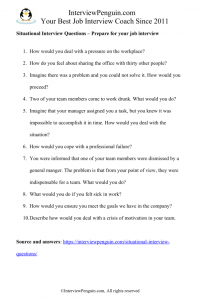When asking situational questions in the interviews, the hiring managers try to understand your attitude to various situations that may happen in the workplace, both ordinary and extraordinary situations. Your answers help them understand your readiness for the job, and for all sorts of scenarios you may encounter during your stay in the company.
Since certain situations repeat in every workplace (managers, blue collar workers, or engineers, they all experience conflicts, pressure, successes and failures, tight deadlines they have to meet and other things), the situational questions do not change much from one interview to another.
Let’s have a look at 15 such questions right now. Do not forget to read also my notes at the end of the article, where I explain the main difference between situational and behavioral-based interviewing, and a couple of other important points.
Table of Contents
How would you deal with the pressure in the workplace?
You have a few options for a good answer to this one. You can say that you would focus on your job, on your daily duties, and would not let the pressure to affect you. Trying your best to meet the deadlines and satisfy the managers, you wouldn’t let the external pressure dictate how you feel.
You can also claim that you work better under pressure, and are used to experiencing it. Another alternative is to say that you would do your best to help to ease the atmosphere in the workplace, and the pressure, for you and also for your colleagues, being supportive, sharing a good joke in a right moment, and so on.
How do you feel about sharing the office with thirty other people?
Open office is a common concept nowadays, mostly because some studies proved that people waste less time when working in an open office setting (other people watch you, so you are likely to spend less time checking your Instagram account, or watching silly videos with cats, that’s what called social pressure).
Bearing this is mind, you should say that you plan to work hard, and enjoy direct interaction with colleagues, and therefor you’d not mind sharing the office with many other people.
Imagine there is a problem and you cannot solve it. What will you do?
This one is an excellent opportunity to show some humility, to show that you are ready to admit your weaknesses and mistakes, and ask another person for help.
Tell the hiring managers that you will consult your colleagues, or even external experts, while trying to handle the problem. Of course you will not try to simply hide the issue, or move the task down on your list of priorities, hoping for a miracle. Not at all. You will involve your colleagues or external experts in the process, and will solve the problem.
Two of your team members come to work drunk. What would you do?
Rule is a rule, and alcohol shouldn’t be tolerated–regardless of the person who broke the rule. Tell the interviewers that you would report your colleagues immediately. Show them that you know what’s right, and would not let your emotions to affect your decisions.
Needless to say, you might do a different thing if it really happened. Maybe you would send them home immediately, without anyone else seeing them, and later say that they were sick or something. In such a way you’d help them save their jobs. While in an interview, however, you should say what the hiring managers want to hear from you.
Imagine that your manager assigned you a task, but you knew it was impossible to accomplish it in time. How would you deal with the situation?
This is a tricky question. What is actually impossible? Can we deem anything impossible? Anyway, unless you love to play with words, you should simply say that you would explain the manager the reasons why it was impossible to accomplish the task in time–according to your opinion.
Then you would suggest a solution, which can be getting assistance from one of the team members, or moving a deadline a few days or a few weeks (depending on the complexity of the task).
How do you plan to cope with failure?
Failures belong to life, both inside and outside of the workplace. Of course you want to try your best, and it hurts when you fail to reach your goals despite putting in a huge effort.
But you should ensure the interviewers that you are ready to cope with failures, learning your lesson, getting the best out of the situation, and moving on to another project. Changing the subject, changing the tasks, and forgetting on the failures quickly is a way to cope with them.
You were informed that one of your team members were dismissed by a general manger. The problem is that from your point of view, they were indispensable for a team. What would you do?
Another tricky question. Certainly you should respect the hierarchy in the organization, and the decisions of your boss. On the other hand, you should give feedback on their work, and you should protect the integrity of your team, and the success of the company.
Perhaps the best answer is to say that you’d ask general manager for a personal meeting, explain your reasons, and try your best to convince them to change their decision. If it didn’t work, however, you’d accept their decision as a final one.
What would you do if you felt sick in work?
A good answer to this question depends a lot on the position you apply for, the shift patterns, and many other variables. Anyway, you should ensure the hiring managers that you try your best to stay healthy, and to not miss work for some light health issue.
Sure enough, everyone experiences some back pain or headache or other issue in 21st century. But you would try to fight with it, getting some fruits and vitamins and whatever, and staying at home would be your last resort. Needless to say, you would not stay at work with high fever and perhaps with an infectious disease, to not infect more colleagues.
Other situational questions you may face in your job interview
- What would you do if you had to work on multiple projects simultaneously? How would you prioritize?
- Imagine that you are overwhelmed with work. What will you do?
- One of your colleagues does not respond to your messages or calls. But you see no apparent reason why they should not respond. Will you talk to them first, or will you raise an issue with the manager?
- Imagine that you do not agree with an internal policy of a company, and find it stupid. Will you still comply to it?
- A customer accuses you of a bad service. How will you react?
- What would you do if you fell behind with your schedule, and were sure you’d not meet an important deadline?
Difference between behavioral and situational interview
The basic difference between behavioral and situational interviewing is that the first one addresses your past (they inquire about situations that already happened to you, either in the workplace or in your life in general), while the other addresses your future (or fiction, or opinion, since you talk about hypothetical situations, scenarios that may happen to you, and are likely to happen in your new job, sooner or later).
Needless to say, it makes sense to use situational questions with entry level job applicants, and with young people in general, and behavioral questions with experienced job candidates–who already have something to talk about.
But just like with many other things in the interviews, not everything makes a perfect sense. More often than not, hiring managers have a template with questions in front of them, and will ask every candidate the same questions–regardless of their level of experience. Hence it may happen that you get behavioral questions in your very first interview, and you should get ready for this option…
Final thoughts, brilliant interview answers
Situational and behavioral questions are becoming ever more popular on both sides of the Pacific Ocean. Your answers reveal a lot about you, and help the interviewers to make a reasonable decision about hiring you, or sending you home empty handed.
If you find the questions difficult, or have no idea what you would say to the hiring managers, have a look at a new eBook I put together for you, Ace Your Behavioral-Based Job Interview. Up to 7 premium answers to 31 tricky behavioral-based questions, including answers for people without previous working experience, will help you streamline your interview preparation, outclass your competitors, and eventually walk away with a new employment agreement. Thank you for checking it out, and good luck in your interviews!
Matthew
May also interest you:
- Teamwork interview questions – Teamwork is an important skill for almost every corporate employee. Learn how the hiring managers test it in the interviews, and prepare for the most common questions you may face.
- Body language in an interview – What do your gestures and movements say about you? Can we control our non-verbal communication? Everything you need to know about this topic.
- Guide on how to overcome interview nerves – If you have a feeling that your nerves do not allow you to show your very best in the meetings with the employers, this is a must read.
* You can also download the list of situational questions in a simple, one page long PDF, print it, and practice your interview answers anytime later, even when offline:


